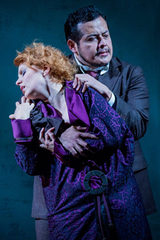| Opera Reviews | 20 April 2024 |
Another feather in the cap of Opera Holland Parkby Moore Parker |
|
| Leoncavallo: Zazà Opera Holland Park 22 July 2017 |
|
|
Both the subject matter (based on a play by Pierre Breton and Charles Simon) and its adaption (with both the lyrics and music by Leoncavallo) ooze the style of the period, and can easily precipitate a certain over-indulgence - which, to some degree, touched this reading by Marie Lambert and her cast and where some introspection and restraint would have been an asset. Act 1 is set in The Alcazar (a variety theatre in Saint-Étienne) with Act 2 focussed upon the action in Zazà’s dressing room. For these scenes the staging (Alyson Cummins) unfortunately placed Zazà’s quarters upstage centre throughout - thus blocking visual access on both sides of the auditorium to the multi-tiered action on the opposite side of the house for the only scenes in which the full ensemble (lavishly-costumed by Camille Assaf) participated. In brief, the plot sees Zazà betting with Bunny (a journalist) that she can win the heart of Milio (a regular visitor to the venue). She succeeds, but Cascart (Zazà’s colleague and unrequited admirer) announces to the diva that Milio is in fact having another affair. Zazà decides to travel to Paris to challenge Milio. Following the interval, the stage is opened-up for Act 3 and Milio’s apartment, where it transpires that Milio is actually married and has a young daughter. Zazà, fettered by her own unhappy childhood, is unprepared to threaten the family entity. Act 4 sees Zazà testing Milio’s love by pretending that she has revealed their affair to his wife and daughter - only to subsequently reveal the truth and send him away when she discovers his true allegiance. Taking the title role, Anne Sophie Duprels is something of an Opera Holland Park favourite, with a number of successes to her credit. Her Zazà is a highly-strung diva - a touch hectoring and frenetic in the opening acts (perhaps partly due to demands from the pit and limp guidance from the director) but finding poise and sincerity in Act 3’s interaction with Milio’s young daughter Totò (Aida Ippolito) and in her passionate Act 4 confrontation with the anti-hero. Joel Montero’s Milio displayed the appropriate ringing tone (albeit, not quite effortless in approach) but rather lacked sufficient variety in shading - both musically and dramatically - to ideally serve the character. As Cascart, Richard Burkhard found the perfect balance for the role in all respects, lending his music an understated (while vocally generous) reading, and creating the most sensitive and sympathetic figure of the evening. Among the strong supporting roles, Johane Ansell’s Floriana, James Cleverton’s Bussy and, in particular, Zazà’s alcoholic mother Anaide (Lousie Winter) stood out with aplomb. Due to the lack of a pit, the orchestra at Holland Park is fully exposed and added to the challenges posed by Leoncavallo’s score and the vibrant stage activities in the evening’s first half. Conductor, Peter Robinson’s sensitive Act 3 opening and his well-paced reading of the ensuing scenes truly unveiled his finesse and the City of London Sinfonia’s potential. The company has a tradition of featuring lesser-known works (often - but not exclusively - from the Italian verismo stable) among their more standard repertoire - a courageous and commendable concept rewarded with full houses and enthusiastic responses. Next season sees Mascagni’s rarity, Isabeau, alongside Così fan tutte, Ariadne auf Naxos and La Traviata.
|
|
| Text ©
Moore Parker Photo © Robert Workman |

 Zazà is an opera that fired the imaginations of divas in the first couple of decades after its fin de siècle premiere in Milan (with Toscanini conducting and Puccini’s first Butterfly, Rosina Storchio, in the title role). Even the legendary Geraldine Farrar chose the work for her Metropolitan Opera farewell in the early 1920’s. And indeed the work is a showcase for a diva with temperament and the ability to milk the music-hall chanteuse’s personality and the drama of her ensuing predicament to the full.
Zazà is an opera that fired the imaginations of divas in the first couple of decades after its fin de siècle premiere in Milan (with Toscanini conducting and Puccini’s first Butterfly, Rosina Storchio, in the title role). Even the legendary Geraldine Farrar chose the work for her Metropolitan Opera farewell in the early 1920’s. And indeed the work is a showcase for a diva with temperament and the ability to milk the music-hall chanteuse’s personality and the drama of her ensuing predicament to the full.





